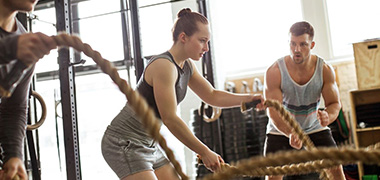
AI Occupational Exposure score unavailable For more insight, research the specific tasks and skills required for the role.
Explore all careersAn Exercise Physiologist designs physical activity programs for clients with diverse needs, assessing progress and adapting plans as required.
Get qualified to work as an Exercise Physiologist with a course recognised across Australia. Speak to a training provider to learn more.
In Australia, a full time Exercise Physiologist generally earns $1,800 per week ($93,600 annual salary) before tax. This is a median figure for full-time employees and should be considered a guide only. As you gain more experience you can expect a potentially higher salary than people who are new to the industry.
 Courses.com.au Team
Courses.com.au Team
This is a relatively new occupation and there are no accurate employment figures available. Exercise Physiologists may find work across all regions of Australia.
Source: Australian Government Labour Market Insights
 Courses.com.au Team
Courses.com.au Team
If a career as an Exercise Physiologist interests you, consider enrolling in a Diploma of Sport Development. You’ll study the principles of Sports Psychology and explore a range of strategies to assist clients with their physical activity needs. This course allows you to choose from a range of specialisations including fitness, coaching and sports academy.
 Courses.com.au Team
Courses.com.au Team



An Exercise Physiologist creates physical activity programs for clients with a range of needs. You might develop exercise plans for people with a disability, people with health issues or people recovering from an injury. Exercise Physiologists may focus on developing fitness, coordination or muscle tone. You might assess progress and re-evaluate needs throughout an exercise program.
Exercise Physiologists should have strong interpersonal skills and be able to work with clients from various backgrounds. You’ll need to be good at communicating and able to listen to your clients’ concerns. Exercise Physiologists should be physically fit and able to demonstrate a range of exercise techniques. It’s important that you are organised and can manage your time well.